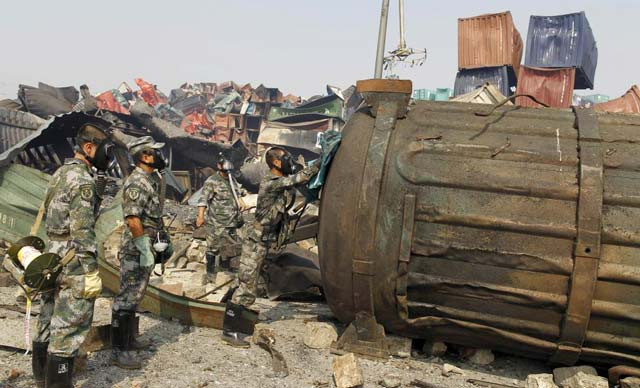Xinhua says China blast warehouse did not have proper licence
The govt has confirmed there was about 700 tons of the deadly chemical sodium cyanide in the warehouse that blew up

Soldiers of the People's Liberation Army anti-chemical warfare corps, wearing gas masks, examine a container at the site of Wednesday night's explosions at Binhai new district in Tianjin, China, August 16, 2015. PHOTO: REUTERS
Two huge blasts at the world's 10th-busiest port in China's northeast last Wednesday forced the evacuation of thousands of people after toxic chemicals were detected in the air.
The death toll has risen to 114, with more than 700 people injured and another 70, mostly fire fighters, still missing. The blasts devastated a large industrial site and nearby residences and sent shockwaves across several kilometres.
 Fire engines are seen at the site of the explosions at the Binhai new district, Tianjin, August 13, 2015. PHOTO: REUTERS
Fire engines are seen at the site of the explosions at the Binhai new district, Tianjin, August 13, 2015. PHOTO: REUTERSWarehouse owner Tianjin Dongjiang Port Ruihai International Logistics did not have certification to handle dangerous goods between October 2014 and June 2015 but continued to work with hazardous chemicals, Xinhua reported, citing an unidentified company official.
A filing on the State Administration for Industry and Commerce (SAIC) website confirmed that Ruihai Logistics did not have the correct licence during that period.
Ten people, including Ruihai head Yu Xuewei and deputy head Dong Shexuan, were detained last Thursday, the official People's Daily's reported on its Weibo microblog on Tuesday.
Read: Hundreds of tonnes' of cyanide at China blasts site: military
Phone numbers listed on the firm's website have been disconnected since Thursday and emails to the company have gone unanswered.
The government has confirmed there was about 700 tons of the deadly chemical sodium cyanide in the warehouse that blew up.
China's top prosecutor, the Supreme People's Procuratorate, has opened an investigation into the explosions. Tianjin deputy mayor He Shushan said officials were confident those responsible would be held to account.
Zong Guoying, Communist Party secretary of Tianjin's Binhai district, told reporters that a service centre had been set up for those whose houses had been damaged.
"In the process of repairing damaged housing and settling claims, the district government has arranged interim expenditures," Zong said. Recompense for damaged property inside homes would be based on "market principles", Zong said.
Hundreds of people who lived near the blast site have demanded that the government arrange compensation or buy back their apartments.
As well as not having the correct licence, Ruihai Logistics was also found to have violated packaging standards during a safety inspection two years ago, China's safety bureau has said.
The company was also added to a list of "abnormally operating" firms by the Tianjin Free Trade Zone Market and Quality Regulatory Commission in July for not following guidelines in reporting its 2013 and 2014 annual results, according to the company's records on the SAIC.
Officials have said environmental standards were still "basically guaranteed" and there were contingency plans to prevent rain from creating dangerous gases or spreading contamination.
Global automakers are struggling to assess the damage to their vehicles at China's largest entry point for imported cars. Volkswagen AG said about 2,700 of its imported cars were damaged.
Industrial accidents are not uncommon in China after three decades of rapid growth.



















COMMENTS
Comments are moderated and generally will be posted if they are on-topic and not abusive.
For more information, please see our Comments FAQ